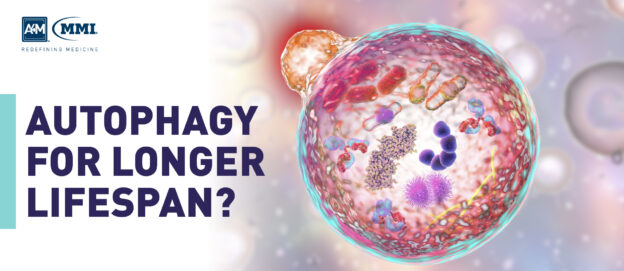Over time, damaged and dysfunctional components of the body’s cells accumulate leading to a potential buildup of cellular debris which can permanently alter the genes, structure, and function of cells. Clearing away these parts is essential for maintaining optimal cellular function and happens naturally in the body during a complex process called autophagy. Scientists are currently investigating the potential benefits and risks involved with inducing autophagy, which has been linked to several positive health effects including the improvement of cellular health and promotion of an elongated human lifespan. Research in this field remains in its early stages yet some studies have revealed promising results that could shape future approaches to functional medicine.
What is Autophagy?
Directly derived from the Ancient Greek term for “self-eating,” autophagy can be viewed as a natural process that responds to the problem of a buildup of unwanted or unnecessary molecules within cells. During autophagy, cells remove dysfunctional components through a lysosome-dependent regulated mechanism that allows for the conserved, orderly degradation and recycling of cellular components.
Inducing Autophagy
Specific triggers are believed to be able to induce autophagy within the body, specifically fasting and calorie restriction, the stress of which can force cells to function more efficiently. In response to caloric scarcity, autophagy can cause the body’s cells to recycle or degrade any unnecessary or damaged components.
Other autophagy triggers include exercise, which also places the body’s cells under stress, curcumin, which has shown a range of benefits in animal studies. For instance, one animal study found that curcumin-induced restoration of autophagy had the potential to protect against diabetic cardiomyopathy while another study conducted in mice reported that the spice was able to ward off cognitive impairment associated with chemotherapy in certain brain regions.
Current science has not yet been able to identify which cells respond to fasting or calorie restriction and whether these can trigger autophagy in brain cells. Furthermore, certain studies have shown that excessive autophagy can lead to the death of heart cells and contribute to cardiovascular problems. The process plays a complex role in cancer treatment as there may be benefits to inhibiting autophagy for limiting tumor growth although, more research is necessary to fully determine its effects on a variety of health conditions. As such, it is important to keep in mind the risks of inducing autophagy as well as the risks associated with specific triggers until more information becomes available.
The Latest Research
A recent study evaluated the existing research concerning autophagy and cancer, reporting both that the process could help stall the development of cancer cells and that it could also promote their growth depending on the stage of disease progression.
Research into the connection between autophagy and liver health has found that the natural process may play a role in several liver functions and potentially prevent the progression of liver conditions, such as Wilson’s disease, acute liver injury, nonalcoholic fatty liver disease, as well as chronic alcohol-related liver disease.
In addition, the latest evidence has linked autophagy to the immune system due to its role in clearing toxins and infectious agents. Previous studies point to the possibility that the process can help control inflammation and protect cells from incoming microbes thereby improving the outlook for cells with infectious and neurodegenerative diseases.
With scientific evidence pointing to both positive and adverse health effects related to autophagy, it is difficult to draw conclusions in part due to the complexity of the process itself and the limited amount of research available; at this time, the majority of studies have been conducted in test tubes or animal models. Further investigation is necessary to fully determine the benefits and risks associated with autophagy as well as how it can be used to influence treatment outcomes and patient health.
Key Takeaways
Autophagy is a natural bodily process that removes damaged and unnecessary cellular components. Researchers are currently investigating the potential benefits and risks of inducing or inhibiting this process to spur health benefits, cure diseases, and elongate the human lifespan. At this time, the body of knowledge concerning autophagy remains underdeveloped and will require significant concrete evidence until any recommendations can be made.
Are you interested in exploring other systems-biology approaches to care? To help you redefine your functional medicine practice and integrate more patient-centered medicine, A4M offers a metabolic medicine fellowship program designed for a wide array of health care practitioners. The Fellowship in Anti-Aging, Metabolic, and Functional Medicine (FAAMFM) delivers the most comprehensive functional, anti-aging, and metabolic medicine training necessary to help clinicians optimize patient outcomes and equip them to serve as leaders at the forefront of the chronic illness crisis. Start your new clinical journey today by registering here.
.

